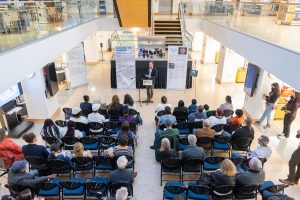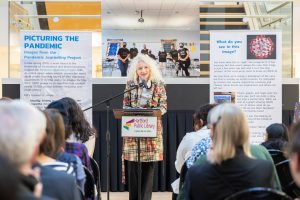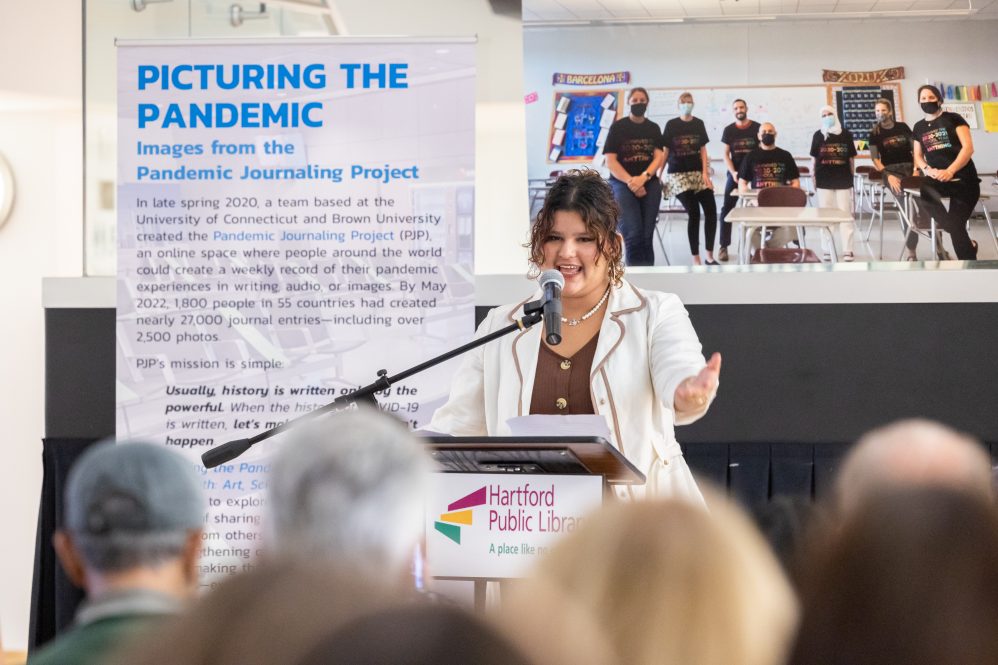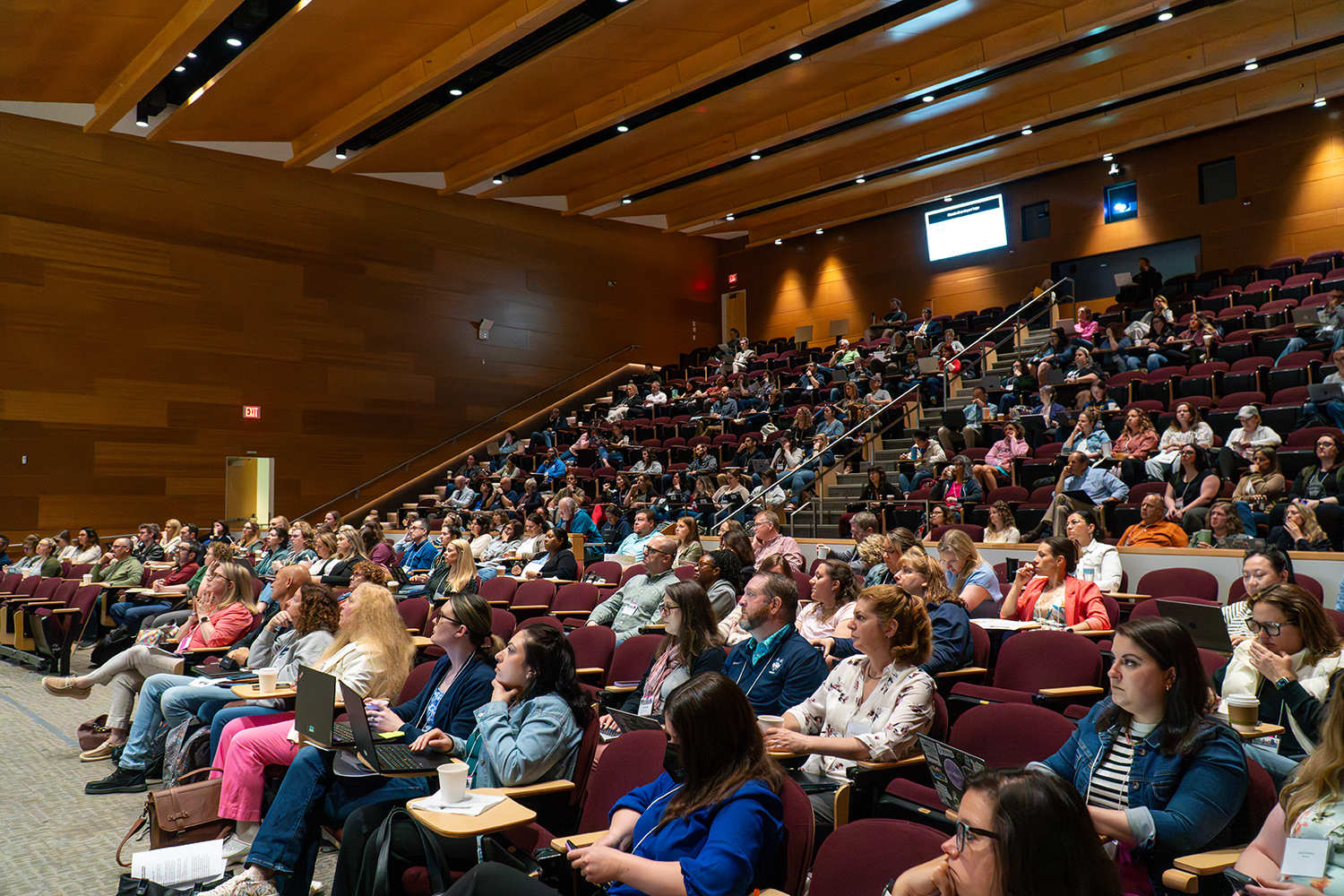The Pandemic Journaling Project (PJP) began in May 2020 as a way to create a lasting record of people’s personal experiences during the COVID-19 pandemic that gripped the world starting that spring. As the virus has become more familiar, the PJP team has started sharing insights with researchers and the broader public, in Connecticut and beyond.
Originally, PJP, which is open to anyone in the world age of 15 or older and fully anonymous, asked people to take a few minutes each week to record their pandemic experiences in writing, photographs, or audio recordings, using a smartphone or computer.
“In our first two years, more than 1,800 people from 55 countries around the world contributed, which we think is pretty extraordinary,” says UConn associate professor of anthropology Sarah Willen, who co-founded the project with Katherine Mason, associate professor of anthropology at Brown University. “We created PJP as a form of ‘archival activism’ – a deliberate effort to pre-design an archive in the present to ensure equitable history-telling in the future. We’ve worked especially hard to preserve the pandemic stories of people whose voices might otherwise be neglected, or ignored.”
In its first two years, the project gathered nearly 27,000 individual journal entries, including over 2,500 photographs and several hundred audio recordings from a diverse array of people.
“As anthropologists, we usually work with much smaller amounts of material,” says Willen. “It’s been thrilling learn how to organize and analyze a trove of material this large.”
All data collected will be stored in the Qualitative Data Repository at Syracuse University, where researchers from around the globe will be able to request permission to use it for the next 25 years. After that, the entire collection will become an open public resource.
“A key goal of PJP is to preserve first-person accounts of this period of crisis and confusion as a way to help balance out top-down narratives,” says Willen. “But we also expected some people would find it meaningful, and maybe even therapeutic, to reflect periodically on the impact of the pandemic in their lives. We’re already learning so much — not just about COVID-19, but also about waves of social protest, anxieties about climate change, and major political events like the 2020 elections and the insurrection on January 6.”
After running as a weekly platform for two years, PJP relaunched in a new format, which new participants are welcome to join. In this new phase, participants are invited to record their thoughts once every three months. Like the first phase, it runs fully in English and Spanish.

PJP also hit the road with a multimedia exhibition, Picturing the Pandemic: Images from the Pandemic Journaling Project, that is on display at the Hartford Public Library through Thursday, December 15.
“This public facing side of the Pandemic Journaling Project has been the most thrilling for me personally,” says Willen. “It really shows what a public land grant institution like UConn can do for the larger community.”
The exhibition is curated by Willen and Alexis Boylan, a professor of art history and Africana Studies at UConn and Director of Academic Affairs for the Humanities Institute. It puts PJP in dialogue with Boylan’s Seeing Truth exhibition, which opens at the William Benton Museum of Art at UConn Storrs in January.
Picturing the Pandemic is supported by a range of internal and external sponsors including the New England Humanities Consortium, the Mellon Foundation, and a range of UConn units including College of Liberal Arts and Studies (CLAS), the Provost’s Office, UConn Hartford, Office of the Vice President for Research, the UConn Humanities Institute, and the UConn Human Rights Institute.
With a CLAS summer research grant, Willen and Boylan ran programs at six Hartford Public Library branches and brought children together of all ages under the theme “how COVID has changed us, and how we can change the world.” Amanda Gorman’s book “Change Sings: A Children’s Anthem” was a feature of the events.
“It’s a beautiful book about how kids can work together to create music, joy, and change toward a more just world,” says Willen. “At each event, we brought art supplies invited children to think about their own pandemic experiences and express them in art. We also read ‘Change Sings’ and made sure every child got a copy of their own to keep.”
Some of the art children created is now on display as part of the exhibition, along with documentary photographs commissioned as part of the library’s Hartford 2020 collection.

Once the exhibition closes in Hartford, it will move to the Providence Public Library in March 2023, where it will also include contributions from Rhode Island citizens.
In spring 2023, the exhibition will also move on to two international destinations. In Heidelberg, Germany, it will be hosted by the Mark Twain Center for Transatlantic Relations, with support from the Connecticut/Baden-Württemberg Human Rights Research Consortium. In Mexico City, it will be on display at El Colegio de México.
Another important aspect of the PJP is the academic research component. So far, the PJP team has published research on topics ranging from the mental health impact of the pandemic to human rights aspects of PJP.
“We’re especially excited to continue exploring the promise of online journaling as a research method, a therapeutic strategy, and a tool for advancing social justice,” says Willen. “We certainly hope the pandemic is winding down, but our work is just beginning.”



